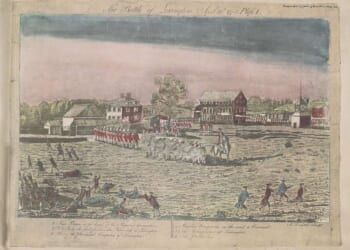This article is taken from the May 2025 issue of The Critic. To get the full magazine why not subscribe? Right now we’re offering five issues for just £10.
It was in Worthing that I first heard of the Skeleton Army. Could it really be true that there were organised mobs beating up temperance activists in Victorian Britain? It seemed too good to be true. Yet true it was. The Salvation Army invited trouble from the start. Founded in 1878 by the self-styled “General” William Booth, they would pitch up in town, find themselves a “barracks” to live in and march through the streets saving drunks for Jesus.
Most of the drunks did not want to be saved. They mostly just wanted to drink. Even those who did not drink disapproved of a bunch of do-gooders with military pretensions parading around with a brass band.
The Skeleton Army, formed in Exeter in October 1881, was only the latest incarnation of violent opposition to the Salvationists. They had been attacked by “roughs” calling themselves the “2nd Squad of The Salvation Army” in Coventry two years earlier.
In Whitechapel, the “Unconverted Salvation Army” had been making its presence felt. There had already been two anti-Salvationist riots in Basingstoke at the hands of the puzzlingly named “Massagainians”.
Gangs of mostly young men hurled stones, flour, beer, paint, dead rats and mud at the Sally Army wherever they found them. Blood was shed. Bones were broken. The windows of the Army’s “barracks” were smashed. This happened all over the country, often night after night.
Some incidents were less serious than others, but as Nigel Bovey says in his history of the Skeleton Army, Blood and Flag, “in today’s Britain even a single incident of the type endured 150 years ago would be considered a major outrage”.
Parodying the Salvationist’s slogan “Soup, Soap and Salvation”, the Skeletons stood under the banner of “Beef, Beer and Bacca”. They adopted the skull and crossbones flag and cobbled together makeshift uniforms.
They even had a newspaper, The Skeleton, for a while, but there seems to have been no national co-ordination, and they had no recognised leader. The violence was more or less spontaneous and could break out anywhere the Salvation Army stepped foot.
In 1882 alone, Bovey identifies Skeleton attacks in Weston-super-Mare, Stroud, Salisbury, Yeovil, Arbroath, Clapton, Crediton, Hackney, Honiton, Oxford, Plympton and Newbury.
By 1883, hundreds of people were travelling to the little market town of Honiton to watch the Sunday skirmishes that had started when Skeletons threw turnips at a Salvationist procession, which had escalated into riots involving upwards of a thousand people.
In Salisbury, the Western Gazette reported that a mob “picked up handfuls of thick mud and threw it at the Army, and as others threw stale eggs and flour the ‘soldiers’ soon presented a pitiable appearance”. Within a week, the Salisbury police were dealing with a crowd of 2,000 Skeletons and their sympathisers.
In Worthing, violence in 1884 led to the Riot Act being read for the only time in the town’s history. A summer of disturbances culminated in August when, as the Worthing Gazette reported, an “immense crowd of men and boys” marched through the streets before bricking the windows of the Salvation Army barracks and using “every conceivable missile” to smash the windows of the house of the man who had rented it to them.
When the Skeletons attempted to break his door down, he fired his revolver at them, shooting one in the jaw, before pulling out his shotgun. The real army eventually had to be called in to keep the peace, but the violence continued, on and off, for another three years.
It was not that the Skeleton Army were irreligious, they just felt Christianity should be practised in moderation
Sympathy for the Salvationists was in short supply. The Worthing Gazette called them “self-satisfied fanatics”. The Portsmouth Evening News argued that “by their mob-raising processions and peace-disturbing harangues, their public singings, their fiddlings, and their shoutings, they have brought all this petty persecution on themselves”.
The response of the authorities in several towns was not to crack down on the Skeletons but to ban Salvation Army processions. This led to the case of Gillbanks vs Beatty (1882) which set the abiding legal precedent that people cannot be banned from peaceful assembly just because it might incite others to assault them.
It would be heartening to think that the Skeleton Army were doughty defenders of Merry Old England against the forces of puritanism, but they were mostly drunken thugs. They were not irreligious; they just felt that Christianity should be practised in moderation.
Nor were they all in the pay of “liquor interests”, as Salvationist folklore has it. The simple truth is the Salvation Army was just really annoying. They were uninvited guests singing in the street at 10pm.
In Worthing and other seaside towns, residents feared that these proselytising popinjays would drive tourists away. The first line of “The Skeleton Hymn” was “Where is our quiet gone?”
When the Riot Act was read in Basingstoke and the Salvationists were forced to disperse, the Skeleton’s frontman said, “That’s all we want,” and went off singing “Rule Britannia”. All they wanted was to be left in peace, and what could be more British than that?







